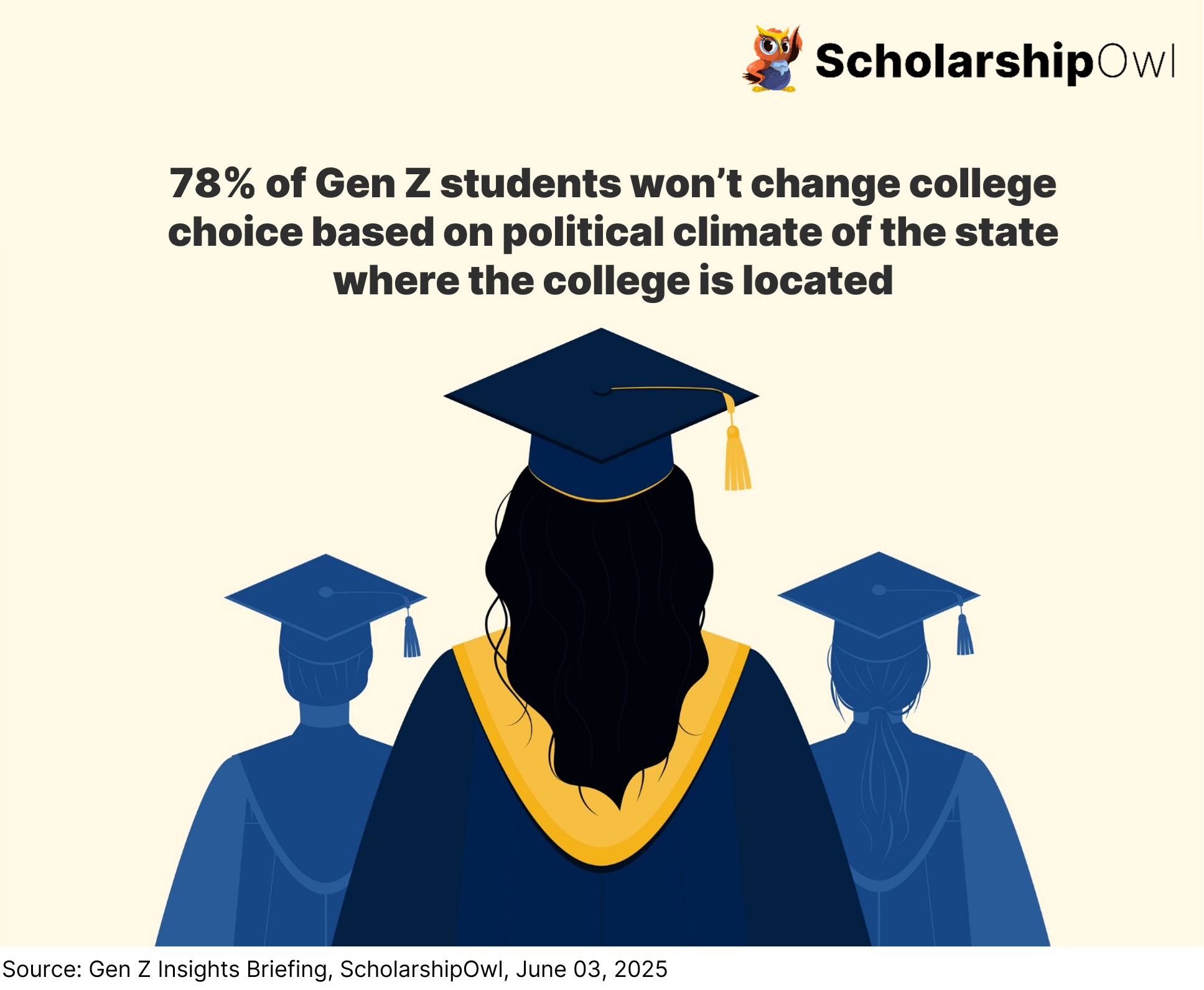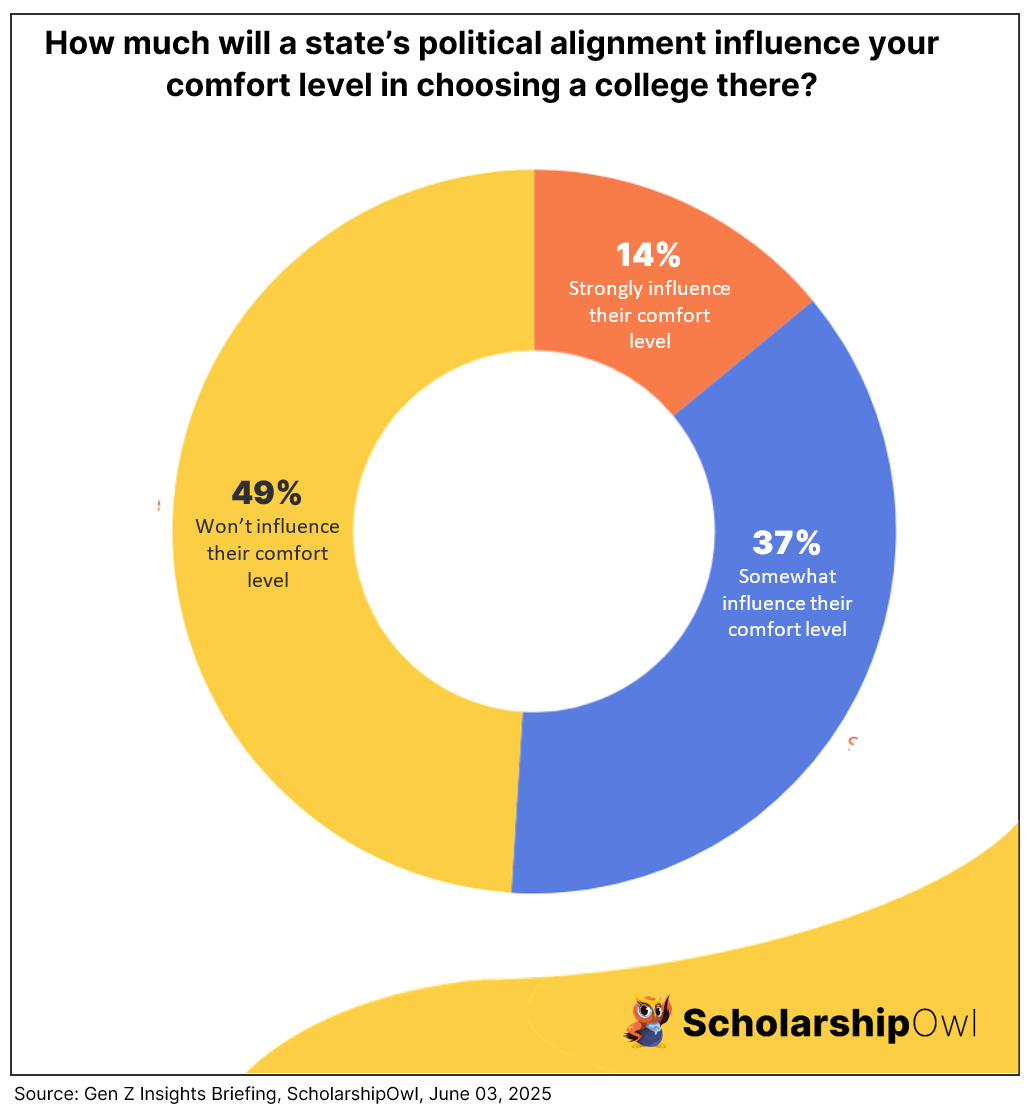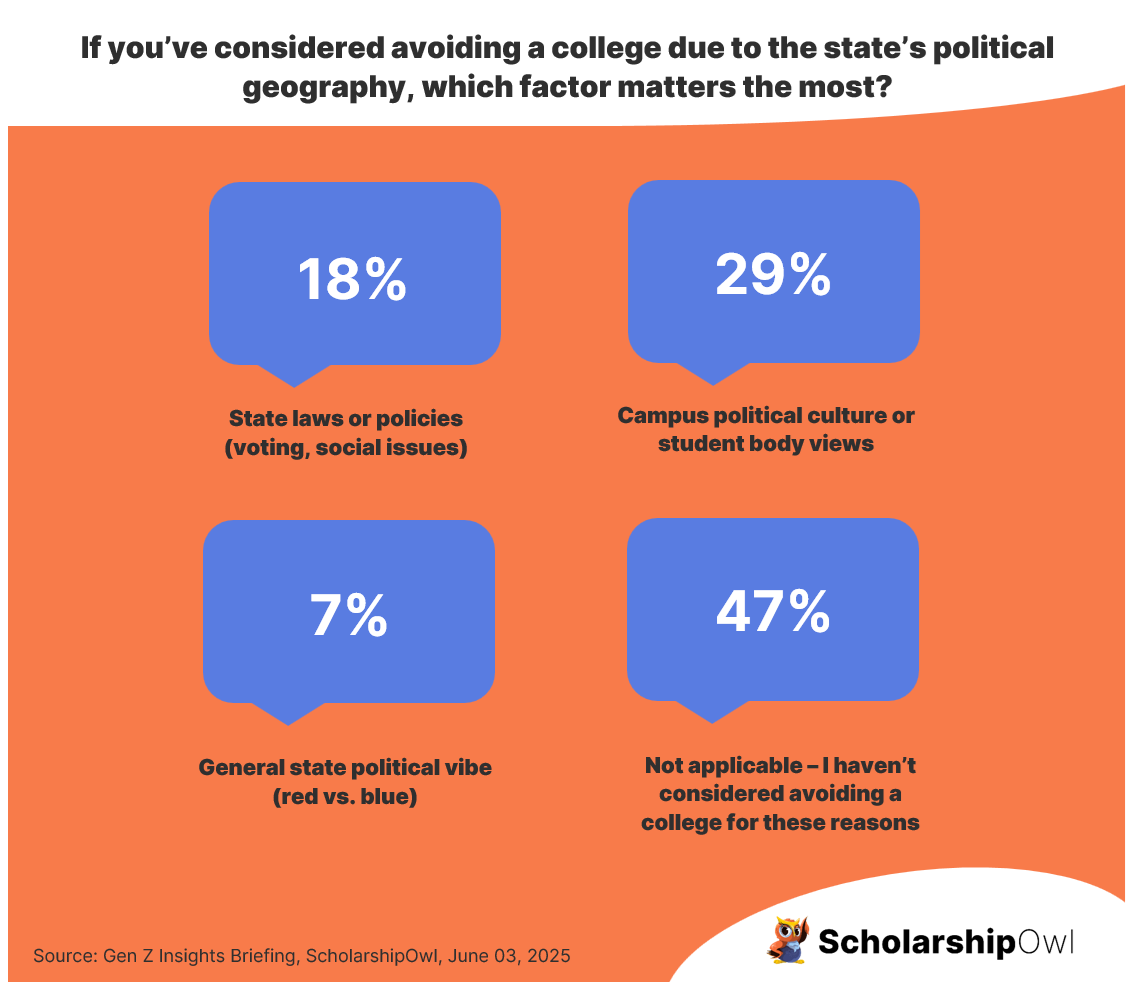Choosing a college is always challenging. Students have to consider their academic fit alongside the affordability of each campus, as well as other factors such as location, size, available sports and activities, campus culture, and more. Today, the conversation around college admissions is more complex and nuanced. In an increasingly polarized world, the political climate of a state as well as the campus itself has become a compelling factor that students contemplate when deciding where to apply, and ultimately, where to enroll. In fact, an October 2024 study conducted by the Art and Science Group LLC found that 28% of students rule out colleges based on state politics or policies – and that both liberal and conservative students are likely to do so. ScholarshipOwl decided to conduct a survey on this important topic, to develop a better understanding of how politics shape college choice, especially in light of the fact that the 2024 election is now behind us, and we have new leadership in Washington.
Who participated in the survey?
In April 2025, ScholarshipOwl surveyed 9,993 high school and college students on the ScholarshipOwl scholarship platform to learn more about how politics shape college choice.
Among the respondents, 59% were female, 39% were male, and 1% identified themselves as a different gender identity or preferred not to respond to the question. Just under half (49%) were Caucasian, 21% were Black, 18% were Hispanic/Latino, 6% were Asian/Pacific Islander, 1% were American Indian/Native American and 6% selected “other” or preferred not to respond to the question.
Nearly two-thirds (62%) of the respondents were high school students, with the overwhelming majority high school seniors; over one-quarter (29%) were college undergraduate students, primarily college freshmen and college sophomores; 8% were graduate students and 3% identified themselves as adult/non-traditional students.
Win more scholarships with less effort
Simplify and focus your application process with the one-stop platform for vetted scholarships.
Check for scholarshipsQuestion 1

The first question asked students if they are considering changing their college choice based on the political climate of the state it is located in – for example, preferring not to live in a predominantly red or blue state.
- 8% said yes, they were leaning toward a different state
- 78% said no, it doesn’t impact their decision
- 14% said they were unsure but open to changing
Question 2

Next, students were asked to how much a state’s political alignment (red, blue, or mixed) influenced their comfort level in choosing a college there.
- 14% said that would strongly influence them
- 37% said it would somewhat influence them
- 49% said it wouldn’t influence them at all
Question 3:

The final question in the survey asked students if they have considered avoiding a college due to it’s state’s political geography, and if so, to cite the factor that matters the most.
- 18% said state laws or policies (voting, social issues)
- 29% said campus political culture or student body views
- 7% said the general state political vibe (red vs blue)
- 47% said the question is not applicable, that they haven’t considered avoiding a college for these reasons
Key Takeaways
While a solid majority (78%) of students stated that state political climate doesn’t impact their college decision, the responses to the subsequent questions reveal a more nuanced reality. It’s not always about a blanket “red vs. blue” preference, but rather specific concerns that emerge when students consider their comfort and safety.
Nearly half (49%) of students said a state’s political alignment would at least “somewhat” or “strongly” influence their comfort level. This suggests that while they might not ultimately change their college choice, a state’s political leaning definitely weighs on their minds. When asked to pinpoint the factors that might lead them to avoid a college, the responses were even more telling:
- Campus Political Culture & Student Body Views (29%) came out on top. This indicates that the immediate environment, the daily interactions, and the perceived openness or closed-mindedness of their peers and campus community matter profoundly. Students are looking for a place where they feel they can truly thrive and belong, even if that means navigating differing viewpoints respectfully.
- State Laws or Policies (18%) also played a significant role. This speaks to a growing awareness among students about how state-level legislation (on issues ranging from voting rights to social policies) can directly impact their lives and rights while living there.
These findings align with broader discussions about the increasing importance of “fit” beyond just academics. It highlights that for a substantial portion of students, the college experience is deeply intertwined with feeling secure, represented, and understood within their chosen environment, where ever they align on the political spectrum. This also relates to a student’s sense of belonging, which is critically linked to student success and retention.
What factors should students consider when making their college choice?

Of course, political views are just one of several factors that students should consider when deciding which college is best-fit for them. When making your own college choice, you’ll want to weigh each of the following:
- Academic Programs & Quality: Does the college offer your desired major with a strong reputation? Are there specialized courses, labs, or faculty expertise that align with your academic goals?
- Financial Aid & Cost: What is the net cost after scholarships and grants? Does the financial aid package make attendance truly affordable? Consider the total cost of attendance, including living expenses.
- Flexibility, Adaptability & Resilience: Both the political climate and advances in technology are heavily impacting higher education as well as the workforce. You’ll want to choose a campus that has the funding, resources, and ingenuity to stay relevant and prepare their students for the jobs that lie ahead.
- Campus Culture & Student Life: Beyond academics, what is the overall vibe? Are there clubs, organizations, and social events that match your interests? What programs and services can students access to ensure they feel like they belong?
- Location: Do you prefer an urban, suburban, or rural setting? How close is it to home? Does the surrounding area offer opportunities for internships, recreation, or community engagement?
- Size & Learning Environment: Do you thrive in a large university with diverse offerings and a bustling atmosphere, or a smaller college with more personalized attention and a tight-knit community?
- Career Services & Outcomes: What support does the college offer for career development, internships, and job placement after graduation? What is their alumni network like?
- Support Services: What resources are available for academic advising, tutoring, mental health support, and other student services?
- Faculty-to-Student Ratio: How much access will you have to professors for mentorship and guidance?
- Residency & Housing: Does the college offer adequate on-campus housing options, or are off-campus living arrangements more common?
- Safety & Wellness: Research campus safety statistics and the resources available for student well-being.
Looking for more resources and support as you make your college choice?
To find out more, visit ScholarshipOwl – your go-to resource for everything you need to know about applying to college, college life, and paying for college with scholarships and other debt-free sources. To find out more, visit www.scholarshipowl.com.



